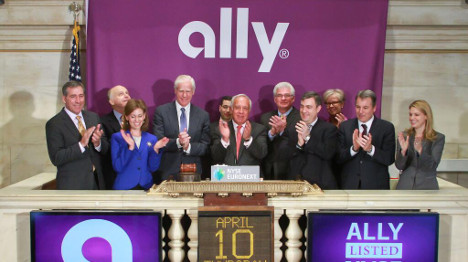Treasury Recoups More TARP Funds in Ally IPO

Chief executive officer Michael Carpenter is joined by other Ally Financial executives during the ringing of the opening bell at the New York Stock Exchange on Thursday. (Photo courtesy of Ally Financial)
By subscribing, you agree to receive communications from Auto Remarketing and our partners in accordance with our Privacy Policy. We may share your information with select partners and sponsors who may contact you about their products and services. You may unsubscribe at any time.
NEW YORK and WASHINGTON, D.C. –
Ally Financial began trading on the New York Stock Exchange Thursday as the U.S. Department of the Treasury agreed to sell 95 million shares of common stock at a price of $25 per share in a plan to generate $2.375 billion in proceeds to taxpayers from Ally’s initial public offering.
According to analysis from Bloomberg from the first day of trading, that share price dropped by 4.1 percent to $23.98. Despite the softening, Treasury officials are confident of IPO success. Including the initial public offering, the Treasury has recovered $17.7 billion on the Ally investment, which is approximately $500 million more than was originally invested in the company.
“Taxpayers’ investment in Ally — together with the broader auto rescue — helped protect the economy by avoiding a catastrophic and disorderly collapse of the American auto industry,” said the Treasury Under Secretary Mary Miller. “With this offering, taxpayers have now recovered more than they invested in Ally.”
Prior to the IPO, taxpayers held approximately 37 percent of common stock in the company, or 177,311,010 shares. After the closing of the offering, taxpayers will hold approximately 17 percent of common stock, or 82,311,010 shares, in the company.
The Treasury has granted the underwriters a 30-day option to purchase an additional 14,250,000 of the Ally common stock shares it holds at the initial public offering price.
Citigroup, Goldman, Sachs & Co., Morgan Stanley and Barclays are acting as joint global coordinators and joint book-running managers on the offering. Joint book-running managers also include BofA Merrill Lynch, Deutsche Bank Securities and J.P. Morgan.
Subscribe to Auto Remarketing to stay informed and stay ahead.
By subscribing, you agree to receive communications from Auto Remarketing and our partners in accordance with our Privacy Policy. We may share your information with select partners and sponsors who may contact you about their products and services. You may unsubscribe at any time.
The Ally IPO is part of the Treasury’s continued progress in winding down the Troubled Asset Relief Program (TARP). Officials reiterated TARP’s most important goal “was to stabilize the financial system and prevent a second great depression, not to make a profit.”
Along with the proceeds from Ally’s IPO and including the sale of Treasury’s AIG shares, Treasury officials calculated they will have recovered a total of $438.3 billion on TARP investments, compared to $423.4 billion disbursed.
“Treasury will continue to evaluate exit strategies for its remaining Ally investment and wind down TARP as soon as practicable, and in a way that maximizes taxpayer value,” officials said.
In an interview with Bloomberg, Ally chief executive officer Michael Carpenter emphasized the company’s strength while pointing to an increase on return on equity to “double-digits” by the fourth quarter of next year.
“We’re currently a low single-digit ROE company and we find that completely unacceptable,” Carpenter told Bloomberg in this report. “It does not at all equate to the strength of our two major franchises. We have a leading, if not pre-eminent position in auto finance, we have a leading online bank.”
Later in the same report after the market closed on Thursday, Carpenter said, “I personally don’t care one way or another how the stock trades, a few pennies one way or another today. Over an 18- to 24-month period, look to us to substantially improve profitability and return on equity of the company.”


